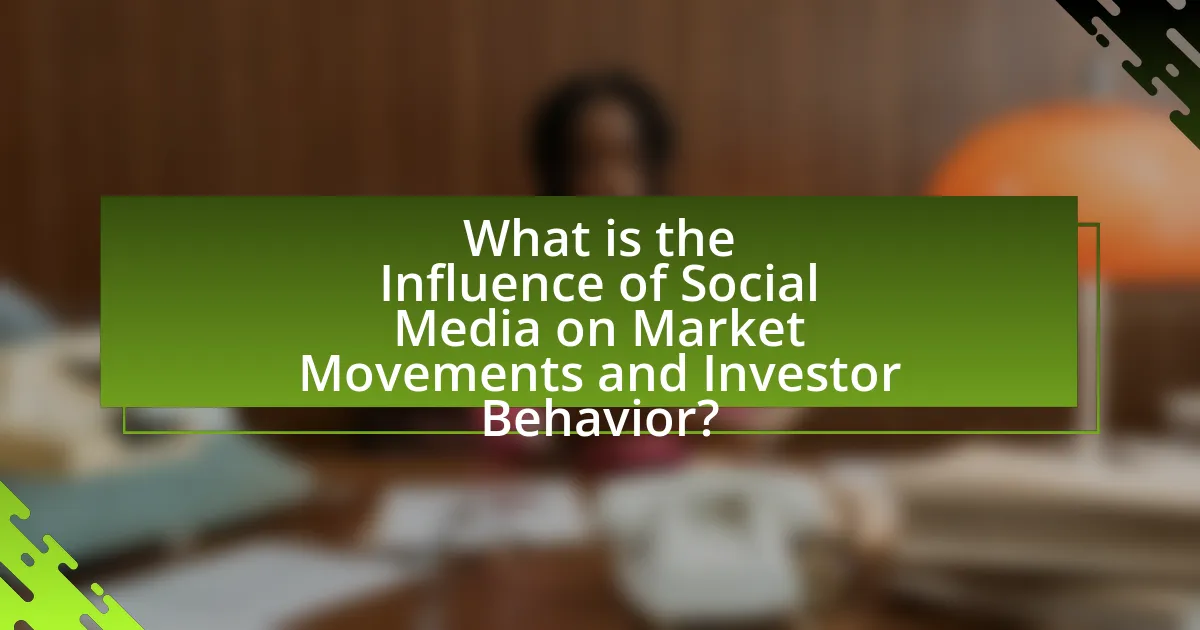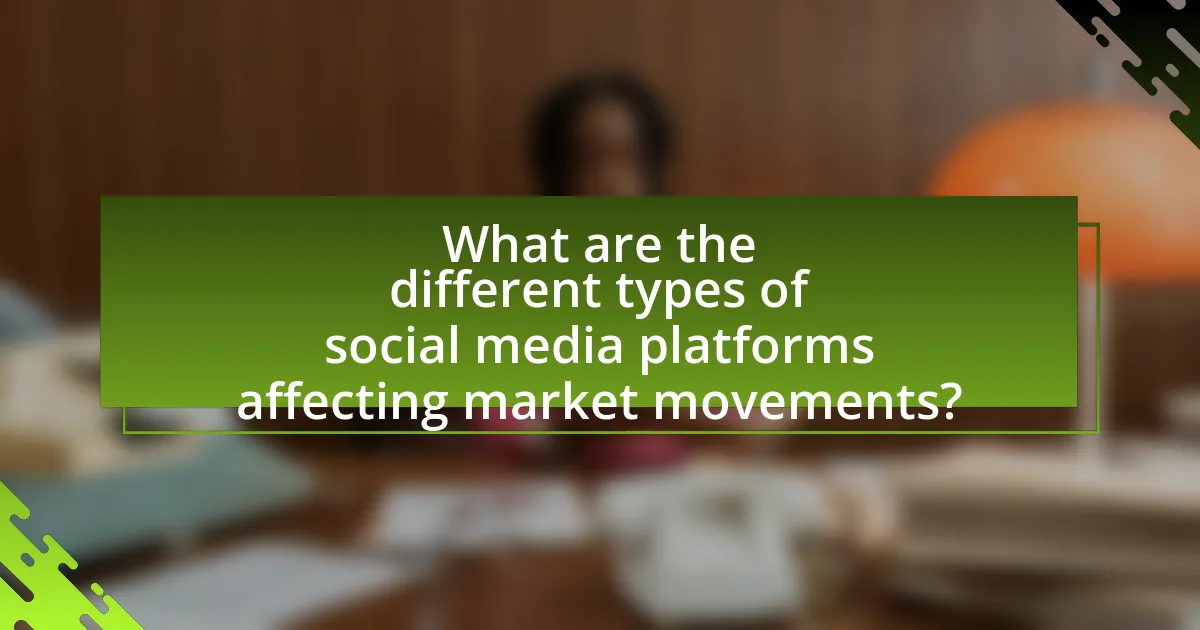The article examines the significant influence of social media on market movements and investor behavior, highlighting how platforms like Twitter and Reddit facilitate rapid information dissemination and shape public sentiment. It discusses key mechanisms through which social media impacts market trends, including information sharing, sentiment analysis, and social proof, with notable examples such as the GameStop short squeeze. The article also explores the psychological factors driving investor decisions, the correlation between social media sentiment and market performance, and the role of various social media platforms in shaping investor behavior. Additionally, it provides insights into how investors can leverage social media for better decision-making while avoiding common pitfalls associated with misinformation and emotional responses.

What is the Influence of Social Media on Market Movements and Investor Behavior?
Social media significantly influences market movements and investor behavior by facilitating rapid information dissemination and shaping public sentiment. Platforms like Twitter and Reddit enable real-time discussions about stocks, leading to phenomena such as “meme stocks,” where collective enthusiasm can drive prices up dramatically. For instance, the GameStop short squeeze in January 2021 exemplified how coordinated buying efforts fueled by social media discussions resulted in a 1,700% increase in the stock price within weeks. Additionally, studies indicate that social media sentiment correlates with stock price movements; a 2020 study published in the Journal of Finance found that positive social media sentiment can predict stock returns. This demonstrates that social media not only informs but also actively shapes investor decisions and market dynamics.
How does social media impact market movements?
Social media significantly impacts market movements by facilitating rapid information dissemination and influencing investor sentiment. Platforms like Twitter and Reddit enable users to share news, opinions, and analyses, which can lead to swift reactions in stock prices. For instance, the GameStop short squeeze in early 2021 exemplified how coordinated buying efforts on Reddit drove the stock price from around $20 to an intraday high of $483, demonstrating the power of social media in mobilizing retail investors and creating volatility. Additionally, studies have shown that social media sentiment can predict stock market trends; for example, research published in the Journal of Finance found that positive tweets about a company often correlate with subsequent increases in stock prices.
What are the key mechanisms through which social media influences market trends?
Social media influences market trends primarily through information dissemination, sentiment analysis, and social proof. Information dissemination occurs as news, trends, and product launches spread rapidly across platforms, impacting consumer awareness and behavior. For instance, a study by the University of Massachusetts found that tweets about stock prices can significantly affect trading volumes and price movements. Sentiment analysis allows investors to gauge public opinion and market sentiment through social media discussions, which can lead to shifts in investment strategies. Research from the Journal of Finance indicates that positive sentiment on platforms like Twitter correlates with stock price increases. Lastly, social proof manifests when users observe others’ buying behaviors or endorsements on social media, leading to increased demand for certain products or stocks, as evidenced by the rise of meme stocks driven by online communities.
How do social media platforms facilitate information dissemination among investors?
Social media platforms facilitate information dissemination among investors by enabling real-time communication and sharing of insights. These platforms allow investors to access a vast array of information, including market trends, stock performance, and expert analyses, often shared by peers and industry professionals. For instance, a study by the Journal of Finance found that tweets related to stock prices can significantly influence trading volume and price movements, demonstrating the impact of social media on investor behavior. Additionally, platforms like Twitter and Reddit have become hubs for discussions that can lead to rapid information spread, affecting market dynamics and investor decisions.
Why is understanding investor behavior in relation to social media important?
Understanding investor behavior in relation to social media is important because social media significantly influences investment decisions and market trends. Research indicates that platforms like Twitter and Reddit can drive stock price movements, as seen in the GameStop short squeeze, where retail investors coordinated through social media to impact the stock’s value dramatically. This phenomenon highlights the need for investors and analysts to comprehend how social media sentiment can affect market dynamics, enabling better risk assessment and investment strategies.
What psychological factors influence investor decisions based on social media content?
Psychological factors that influence investor decisions based on social media content include social proof, herd behavior, and emotional responses. Social proof occurs when investors look to the actions and opinions of others on social media to guide their own decisions, often leading to a bandwagon effect where they follow popular trends. Herd behavior is closely related, as it describes the tendency of individuals to mimic the actions of a larger group, especially during market volatility, which can amplify price movements. Emotional responses, such as fear of missing out (FOMO) or anxiety during market downturns, can also drive impulsive decisions influenced by social media narratives. Research by the University of California, Berkeley, indicates that social media sentiment can significantly predict stock price movements, highlighting the impact of these psychological factors on investor behavior.
How does social media sentiment correlate with market performance?
Social media sentiment significantly correlates with market performance, as positive sentiment often leads to increased stock prices while negative sentiment can result in declines. Research conducted by Bollen et al. (2011) demonstrated that fluctuations in Twitter sentiment could predict changes in the Dow Jones Industrial Average, indicating a direct relationship between public sentiment on social media and market movements. Additionally, a study by Zhang et al. (2018) found that companies with higher positive sentiment on platforms like Twitter experienced better stock performance, reinforcing the idea that social media sentiment serves as a leading indicator for market trends.

What are the different types of social media platforms affecting market movements?
Different types of social media platforms affecting market movements include social networking sites, microblogging platforms, and content-sharing platforms. Social networking sites like Facebook and LinkedIn facilitate discussions and information sharing among users, influencing investor sentiment and market trends. Microblogging platforms such as Twitter allow for real-time updates and rapid dissemination of news, which can lead to immediate market reactions. Content-sharing platforms like Instagram and YouTube enable influencers to shape public perception and consumer behavior, impacting brand value and stock prices. Research indicates that social media sentiment can predict stock market movements, with a study by Bollen et al. (2011) demonstrating a correlation between Twitter mood and stock market performance.
Which platforms are most influential in shaping investor behavior?
Social media platforms such as Twitter, Reddit, and Facebook are the most influential in shaping investor behavior. Twitter serves as a real-time news source where investors follow market trends and sentiment, while Reddit, particularly the WallStreetBets community, has demonstrated significant impact on stock prices through collective buying behavior. Facebook facilitates discussions and information sharing among investors, influencing their decisions. A study by the University of California, Berkeley, found that social media sentiment can predict stock market movements, highlighting the correlation between online discussions and investor actions.
How do Twitter and Reddit differ in their impact on market movements?
Twitter and Reddit differ in their impact on market movements primarily through their user demographics and content dynamics. Twitter’s influence is often driven by real-time news dissemination and the presence of institutional investors, leading to rapid market reactions to trending topics or tweets from influential figures. In contrast, Reddit’s impact is characterized by community-driven discussions, particularly within subreddits like WallStreetBets, where collective sentiment can lead to significant price movements, as seen in the GameStop short squeeze in early 2021. This difference in engagement styles results in Twitter facilitating quicker, often more volatile market responses, while Reddit fosters a more grassroots, sustained momentum around specific stocks.
What role do financial news websites and blogs play in investor decision-making?
Financial news websites and blogs significantly influence investor decision-making by providing timely information, analysis, and insights into market trends. These platforms serve as critical sources of data that investors rely on to make informed choices, often impacting their trading strategies and portfolio management. For instance, a study published in the Journal of Finance found that news articles can affect stock prices within minutes of publication, demonstrating the immediate impact of financial news on market behavior. Additionally, blogs often offer diverse perspectives and analyses that can shape investor sentiment, further guiding their decisions in volatile markets.
What types of content on social media drive market changes?
Content on social media that drives market changes includes news articles, influencer endorsements, user-generated content, and viral trends. News articles provide timely information that can affect stock prices, as seen when major financial news breaks on platforms like Twitter, leading to immediate market reactions. Influencer endorsements can sway consumer behavior and stock performance, exemplified by celebrities promoting specific brands, which can lead to increased sales and market interest. User-generated content, such as reviews and testimonials, influences public perception and can impact market dynamics, particularly in sectors like technology and consumer goods. Viral trends, often seen on platforms like TikTok, can create sudden demand for products, leading to rapid market shifts, as demonstrated by the surge in popularity of certain stocks linked to trending products.
How do memes and viral trends affect stock prices?
Memes and viral trends significantly influence stock prices by driving retail investor interest and creating rapid fluctuations in demand. For instance, the GameStop short squeeze in January 2021 exemplified how a meme-driven movement on Reddit led to a dramatic increase in the stock price, rising from around $20 to an intraday high of $483. This phenomenon occurs as social media platforms amplify information, allowing trends to spread quickly and encouraging collective buying behavior among investors. The resulting volatility can lead to substantial price changes, often disconnected from the underlying fundamentals of the companies involved.
What is the significance of influencer endorsements in financial markets?
Influencer endorsements in financial markets significantly impact investor behavior and market movements by shaping perceptions and driving engagement. Research indicates that endorsements from trusted influencers can lead to increased trading volumes and price volatility, as seen in the case of cryptocurrencies where social media buzz often precedes price surges. For example, a study by the University of California, Berkeley, found that tweets from influential figures can lead to a 10% increase in stock prices within hours. This demonstrates that influencer endorsements can create a ripple effect, influencing both retail and institutional investors, thereby altering market dynamics.

How can investors leverage social media for better decision-making?
Investors can leverage social media for better decision-making by utilizing real-time information and sentiment analysis to gauge market trends. Social media platforms provide immediate access to news, opinions, and discussions that can influence stock prices and investor sentiment. For instance, a study by the University of California, Berkeley, found that Twitter sentiment can predict stock market movements with a correlation of up to 87%. By analyzing trending topics and public sentiment, investors can make informed decisions that align with market dynamics. Additionally, engaging with financial influencers and communities on platforms like Twitter and Reddit can provide insights and diverse perspectives that enhance investment strategies.
What strategies can investors use to interpret social media signals effectively?
Investors can effectively interpret social media signals by employing sentiment analysis, trend monitoring, and influencer identification. Sentiment analysis involves using natural language processing tools to gauge public sentiment towards specific stocks or market trends based on social media posts. For instance, a study by Bollen et al. (2011) demonstrated that Twitter sentiment could predict stock market movements, indicating the relevance of this strategy.
Trend monitoring requires investors to track the frequency and context of discussions around particular assets, allowing them to identify emerging trends before they become mainstream. Tools like Google Trends and social media analytics platforms can assist in this process.
Influencer identification focuses on recognizing key opinion leaders within social media platforms whose endorsements can significantly sway market perceptions. Research shows that stocks mentioned by influential figures often experience price movements shortly after their posts, underscoring the importance of this strategy.
By integrating these strategies, investors can enhance their decision-making processes and respond more adeptly to market signals derived from social media.
How can investors differentiate between credible information and misinformation on social media?
Investors can differentiate between credible information and misinformation on social media by verifying sources, cross-referencing facts, and analyzing the context of the information. Credible information typically comes from established financial news outlets, verified accounts, or experts in the field, while misinformation often lacks reliable citations or originates from anonymous or unverified sources. A study by the Pew Research Center found that 64% of Americans believe that social media has a significant role in spreading misinformation, highlighting the need for critical evaluation of content. Additionally, tools such as fact-checking websites and social media analytics can assist investors in assessing the reliability of the information they encounter.
What tools are available to analyze social media sentiment related to stocks?
Several tools are available to analyze social media sentiment related to stocks, including Brandwatch, Hootsuite Insights, and Sentiment140. Brandwatch utilizes advanced analytics to track and analyze conversations across various social media platforms, providing insights into public sentiment about specific stocks. Hootsuite Insights offers real-time social media monitoring and sentiment analysis, allowing users to gauge market sentiment effectively. Sentiment140 specializes in Twitter sentiment analysis, using natural language processing to assess the emotional tone of tweets related to stocks. These tools are widely used in the finance industry to inform trading strategies and understand investor behavior.
What best practices should investors follow when using social media for investment insights?
Investors should prioritize verifying information from credible sources when using social media for investment insights. This practice helps mitigate the risks associated with misinformation, which can lead to poor investment decisions. According to a 2021 study by the CFA Institute, 75% of investors reported that they rely on social media for investment information, yet only 30% verify the credibility of the sources. Additionally, investors should engage with a diverse range of perspectives to avoid echo chambers, as this broadens their understanding of market trends. Utilizing tools like sentiment analysis can also enhance their ability to gauge market reactions to news and events.
How can investors create a balanced approach to social media and traditional research?
Investors can create a balanced approach to social media and traditional research by integrating insights from both sources to inform their decision-making. This involves actively monitoring social media platforms for real-time sentiment analysis and trends while simultaneously relying on traditional research methods, such as financial reports and market analysis, to validate and contextualize the information gathered from social media. For instance, a study by the CFA Institute found that 70% of investment professionals use social media to gather insights, but they also emphasize the importance of traditional research for comprehensive analysis. By combining these approaches, investors can mitigate the risks associated with misinformation prevalent on social media and enhance their overall investment strategy.
What common pitfalls should investors avoid when relying on social media for market insights?
Investors should avoid the pitfalls of misinformation, emotional decision-making, and herd mentality when relying on social media for market insights. Misinformation can spread rapidly on platforms, leading to poor investment choices based on false data or rumors. Emotional decision-making occurs when investors react impulsively to trending topics or sensational posts, often resulting in losses. Additionally, the herd mentality can cause investors to follow popular trends without conducting their own analysis, which can lead to buying at inflated prices or selling at a loss. According to a study by the CFA Institute, 82% of investors reported that social media influences their investment decisions, highlighting the importance of critical evaluation of information.



